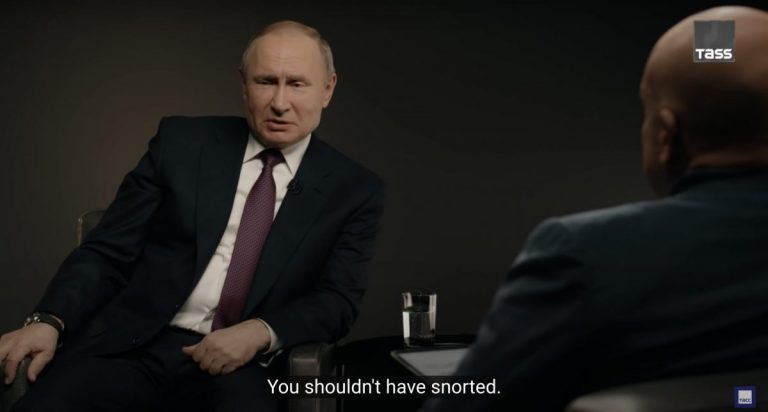
VIDEO Vladimir Putin l-a apostrofat pe un jurnalist pentru că a tuşit ‘nepotrivit’ în timpul unui interviu: ‘Degeaba behăiţi!’
Preşedintele rus Vladimir Putin a făcut din viaţa sa personală şi a familiei sale secret de stat, iar atunci când presa încearcă să ridice măcar puţin vălul de pe acest mister, Putin este nemilos chiar şi cu ziariştii apropiaţi Kremlinului, potrivit mass-media ruse, preluate de Agerpres.
Urmărește cele mai noi producții video G4Media
- articolul continuă mai jos -
Întrebat despre una dintre fiicele sale în cadrul unui interviu acordat agenţiei oficiale de presă TASS, Putin – care nu a dorit să răspundă întrebare – l-a apostrofat pe Anton Vandenko atunci când acesta a tuşit, considerând că a făcut-o cu ‘subînţeles’: ‘Degeaba behăiţi!’, relatează postul de televiziune independent Dojd şi publicaţia Lenta.ru. Interviul este postat şi pe site-ul de internet al TASS.
Vandenko a dorit să afle cine este persoana cu cea mai mare autoritate pentru nepoţii şefului statului rus. ‘Ei sunt încă mici. Pe unul dintre ei, fiica mea a început deja să-l înveţe să înţeleagă ce înseamnă viaţa’, a răspuns Putin. Jurnalistul l-a întrebat despre care dintre cele două fiice ale preşedintelui este vorba, ştiindu-se că el are două fete, Maria şi Ekaterina, ţinute departe de ochii lumii după ce tatăl lor a urcat pe Olimpul puterii din Rusia la începutul anului 2000.
‘Ce contează?’, a replicat preşedintele rus, dând impresia că îşi păstrează calmul. În acel moment jurnalistul a exclamat ‘oh’ şi a tuşit. ‘Degeaba behăiţi!’, l-a apostrofat imediat Putin. ‘Nu behăi, tuşesc!’, nu s-a pierdut ziaristul cu firea. ‘Cu atât mai mult. Nu aveţi de ce tuşi. Nu trăiţi viaţa mea şi nu înţelegeţi ce înseamnă problemele de securitate. Când o persoană este departe de toate astea, nu le observă pur şi simplu’, a explicat preşedintele rus, păstrându-şi zâmbetul pe chip.
Fragmentul de interviu, ultima parte din proiectul special al TASS ’20 de întrebări pentru Vladimir Putin’, a fost dat publicităţii în urmă cu două zile, la 7 octombrie, când şeful statului rus a împlinit 68 de ani.
(Momentul la minutul 2:20):

Donează lunar pentru susținerea proiectului G4Media
Donează suma dorită pentru susținerea proiectului G4Media
CONT LEI: RO89RZBR0000060019874867
Deschis la Raiffeisen Bank



15 comentarii